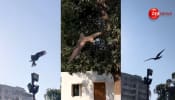Havana: Cuba on Wednesday released the last two of 75 dissidents jailed in a 2003 crackdown, closing a controversial chapter in the long battle between the island`s communist-led government and its opponents.
Felix Navarro Rodriguez and Jose Daniel Ferrer Garcia returned to their homes after eight years behind bars for what Cuba viewed as US-inspired subversion.
The two had been jailed since the March 2003 "Black Spring" crackdown and had been serving 25-year sentences.
President Raul Castro agreed last July, in a deal brokered by the Catholic Church, to free the 52 people still behind bars from the crackdown.
The Black Spring prisoners were not Cuba`s only jailed dissidents, but they became a rallying point for human rights activists and opponents to Cuba`s government.
Their cause was taken up by the United States, Europe and various rights groups.
Amnesty International said on Wednesday the release of the final two was "a step in the right direction for human rights in Cuba" but that authorities must now allow rights activists to do their work "without fear of threats, harassment, further arrests or unfair trials”.
The process of freeing the 52 had been drawn out by Cuba`s desire to send the released prisoners to Spain, which has agreed to accept them, and the insistence of 12 of the men to stay. They were the last to be freed, but were allowed to remain in Cuba, on probation.
All of the 12 have said they plan to continue the activities that got them imprisoned in the first place.
Fight will go on
Navarro, 57, said from his home in Perico, 100 miles east of Havana, he would "continue the peaceful, not violent struggle" for democracy in Cuba.
"The fight now will be with greater vehemence, but also greater maturity," said the farmer and teacher.
Ferrer, a 40-year-old fisherman from eastern Santiago de Cuba, said he rejected going to Spain because "I want to see a free people, and the best place to fight is here inside."
The United States, Cuba`s long time ideological enemy, had not yet commented on the completion of the releases.
Relations between the two countries have been strained by Cuba`s recent sentencing of US aid contractor Alan Gross to 15 years in prison. Gross was accused of trying to spread illegal Internet access in Cuba under a US program promoting political change on the island.
European Union foreign policy chief Catherine Ashton welcomed the releases and encouraged "the Cuban government to pursue this process and continue to make progress toward full respect for all human rights in Cuba”.
She said the EU would continue pursuing "dialogue with the Cuban authorities”.
Castro has told Catholic leaders he wants to clear the jails of all political prisoners and has released several dozen apart from the 52, all of whom have gone or will go to Spain.
Some activists say about 50 remain behind bars, but estimates vary widely.
Bureau Report















